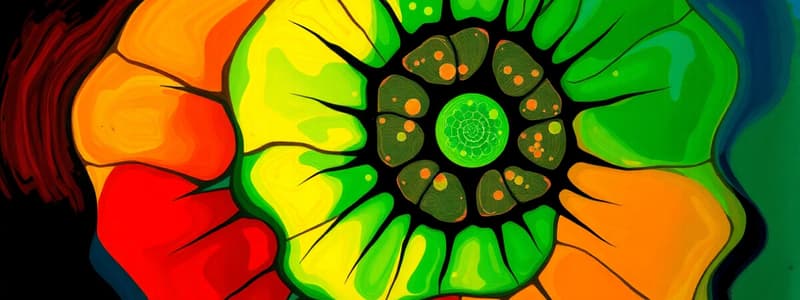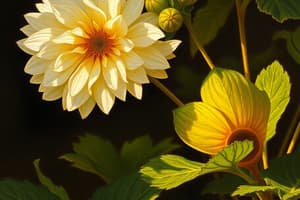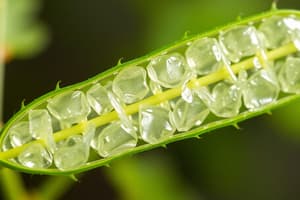Podcast
Questions and Answers
What is the primary function of chlorophyll in photosynthesis?
What is the primary function of chlorophyll in photosynthesis?
- Releases oxygen as a byproduct
- Absorbs sunlight to initiate the photosynthetic process (correct)
- Stores energy in the form of glucose
- Transports electrons in the electron transport chain
Which of the following processes occurs during the light-dependent reactions?
Which of the following processes occurs during the light-dependent reactions?
- Glucose synthesis
- Carbon fixation
- NADPH recycling
- Electron transport chain formation (correct)
In which part of the chloroplast does the Calvin cycle take place?
In which part of the chloroplast does the Calvin cycle take place?
- Granum
- Intermembrane space
- Stroma (correct)
- Thylakoid membranes
What byproduct is released during the light-dependent reactions of photosynthesis?
What byproduct is released during the light-dependent reactions of photosynthesis?
What role do ribosomes play in chloroplasts?
What role do ribosomes play in chloroplasts?
Which stage of the Calvin cycle involves converting one compound into another and recycling some molecules?
Which stage of the Calvin cycle involves converting one compound into another and recycling some molecules?
What is the function of the thylakoids in chloroplasts?
What is the function of the thylakoids in chloroplasts?
What is the primary function of chloroplasts in plant cells?
What is the primary function of chloroplasts in plant cells?
Which organelle is responsible for producing ATP, the energy currency of the cell?
Which organelle is responsible for producing ATP, the energy currency of the cell?
Where in the chloroplast does the process of photosynthesis primarily take place?
Where in the chloroplast does the process of photosynthesis primarily take place?
What role do ribosomes play in plant cells?
What role do ribosomes play in plant cells?
What is the function of the plasma membrane in plant cells?
What is the function of the plasma membrane in plant cells?
Which structure in a plant cell is involved in the storage and maintenance of waste?
Which structure in a plant cell is involved in the storage and maintenance of waste?
What characteristic distinguishes plant cells as eukaryotic cells?
What characteristic distinguishes plant cells as eukaryotic cells?
What process occurs through plasmodesmata in plant cells?
What process occurs through plasmodesmata in plant cells?
Study Notes
Photosynthesis
- Photosynthesis is the process where organisms use light energy, carbon dioxide and water to create food.
- This process occurs within chloroplasts of plant cells.
- Chloroplasts are specialized organelles that contain chlorophyll, a pigment which gives plants their green color.
- Each plant cell contains one to hundreds of chloroplasts.
- Plant cells are eukaryotic meaning they have a unique membrane surrounding them and a nucleus that regulates cell functions.
- The cell wall provides structure and protects the cell.
- The plasma membrane regulates chemicals and supplies going in and out of the cell, also used for communication.
- Plasmodesmata allows communication and flow between cells.
Chloroplast Structure
- Chloroplasts have an outer membrane, inner membrane, stroma, granum, thylakoid, lamella, and lumen.
- Chlorophyll is found within the thylakoid membranes of the chloroplast.
- Chlorophyll absorbs light into the chloroplast cell.
- Chlorophyll Type A, the green-colored chlorophyll, is mainly responsible for photosynthesis.
- The outer and inner membranes regulate the movement of molecules in and out of the chloroplast.
- The stroma is a fluid found in the chloroplast cavity.
- The light-independent reaction process of photosynthesis takes place in the stroma.
- Granum are stacks of thylakoids.
- Thylakoids, or grana, are the sites of the light-dependent reaction process of photosynthesis and contain chlorophyll.
- The lamella acts as a filter for chemicals entering or leaving the chloroplast.
- The lumen is inside the thylakoids and is where oxygen is produced during photosynthesis by removing hydrogen atoms from water.
- Chloroplast DNA contains instructions for photosynthesis.
- Chloroplasts also have ribosomes that are responsible for energy conversion during photosynthesis and carbon fixation during the Calvin cycle.
- The endosymbiotic theory suggests that chloroplasts evolved from prokaryotic single-celled organisms.
Photosynthesis Processes
- There are two main processes involved in photosynthesis: the light-dependent reaction and the Calvin cycle.
- The light-dependent reaction occurs in the thylakoid membranes.
- Sunlight energizes electrons in chlorophyll molecules, creating an electron transport chain.
- Energy is released from the electron transport chain to create ATP and NADPH.
- As electrons lose energy, chlorophyll molecules replace them with hydrogen (H+) protons from water (H2O).
- Oxygen (O2) is released as a byproduct.
- The Calvin cycle, or light-independent reaction, takes place in the stroma.
- Energy from ATP and NADPH is used to create glucose (a type of sugar).
- The Calvin cycle has three main stages: carbon fixation, reduction, and regeneration.
- Carbon fixation involves enzymes creating new compound elements.
- Reduction converts one compound into another and recycles certain molecules.
- Regeneration sends some molecules back to the light-dependent reaction while others form glucose.
Thylakoids
- Thylakoids are small, oval-shaped structures composed of membranes containing chlorophyll.
- Stacks of thylakoids are called granum.
- Chlorophyll A is located in the thylakoids and is essential for photosynthesis as it absorbs specific wavelengths of light energy.
- The thylakoids are the site of the light-dependent reaction.
Stroma
- Stroma is the liquid material found throughout the chloroplast cavity.
- It provides volume and protection for different structures inside the chloroplast.
- The Calvin cycle takes place in the stroma.
- Glucose produced by the Calvin cycle remains in the stroma until needed.
Studying That Suits You
Use AI to generate personalized quizzes and flashcards to suit your learning preferences.
Description
Explore the fascinating process of photosynthesis and the intricate structure of chloroplasts in plant cells. This quiz covers the role of chlorophyll, the components of chloroplasts, and how plant cells function. Test your knowledge of these essential biological concepts!




